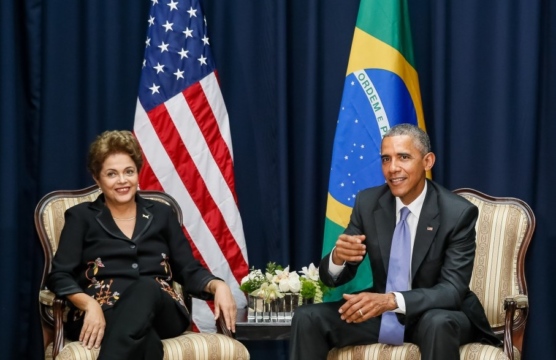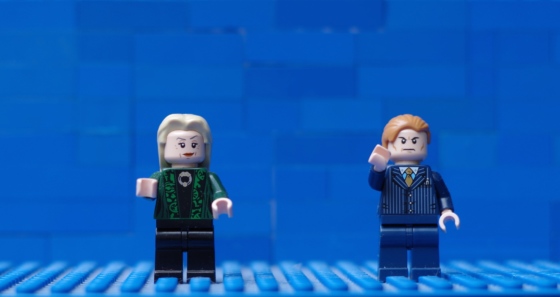
The Future of US-Brazil Relations
Can the US and Brazil rise above their differences and find reasons to cooperate more effectively?
A Daily Publication of The Dialogue
Jair Bolsonaro visited Washington for the first time as Brazil’s president this week and on Tuesday discussed issues including trade ties, military cooperation and the ongoing turmoil in Venezuela with U.S. President Donald Trump. What came of the visit, and how might it affect Brazil-U.S. relations going forward? What are the most important areas of cooperation between the two countries, and what issues remain major sticking points? What is motivating Bolsonaro’s policy toward the United States, and how much of a turnaround will it be from the approach of past Brazilian administrations?
Peter Hakim, president emeritus at the Inter-American Dialogue: “The prospect of a re-energized U.S.-Brazil relationship has fired up both nations’ governments. Bilateral ties have been cool and detached for the past half-dozen years. Presidents Bolsonaro and Trump demonstrate a special affinity—sharing similar worldviews, convergent policy priorities and matching temperaments. Both have proclaimed enthusiasm for deeper, more robust economic, political and security relations. The United States wants Brazil on its side. Recently, the White House has focused much of its Latin America attention on Venezuela and Cuba, pursuing regime change in both. The United States has steadily escalated pressures on the Maduro government, even suggesting a willingness to employ military force. Washington sees Brazil’s backing as essential for a successful strategy. For its part, Brazil views U.S. support on trade and other economic issues as crucial to its struggle to recharge its static, troubled economy—the Bolsonaro government’s most critical task. This would help build confidence of domestic banking and corporate communities and reassure international investors about Brazil’s economic future. Will the gains from Bolsonaro’s visit lead to a broader reshaping and deepening of bilateral ties? Will they generate momentum for new U.S.-Brazil trade arrangements, cooperation on nuclear proliferation and energy development, or backing for Brazil’s aspiration for a permanent seat on the U.N. Security Council? It is too early to say. The obstacles remain substantial: Brazil’s tradition of diplomatic independence, divergent interests of the two nations and existing Brazilian commitments to other partners, including Argentina and China. Trump and Bolsonaro are rather anomalous leaders. They could profoundly change their countries or depart without leaving much behind. Brazil could diminish its global stature by yielding its international autonomy and tying itself to the United States. Similarly, by once again embracing a strongman leader, it may see its global status shrink.”
Rubens Barbosa, former Brazilian ambassador to the United States: “Diverging from a longstanding Brazilian foreign policy tradition, Bolsonaro’s second visit abroad took place in the United States. Both governments are saying that there was a fundamental change in bilateral relations and that a North-South alliance will be created, given the close personal relationship between the two presidents. Facts in the future will show the concrete results of Bolsonaro’s visit and how permanent they are, but it has created an opportunity to advance in several areas, such as trade, defense, security and innovation. However, it does not represent a complete turnaround from the approach of past Brazilian administrations, as the difference on how to deal with Maduro suggests. Brazil and the United States have a wide area of convergence and asymmetries. In the last few years, defense and security have been added as another focal point for domestic and regional considerations. There are pending trade restrictions in both countries that were not resolved during the visit, with the exception of wheat and pork. From the Brazilian point of view, the Trump administration’s decision to support Brazil’s effort to join the OECD, as well as Trump support for non-NATO ally status and the positive conclusion of the space technology safeguard agreement represent important steps forward and are the most significant results of the visit. Bolsonaro is the first president to have been elected with a rightist platform in Brazil: liberal on the economy and very conservative in values and social principles. There are clear ideological affinities with President Trump and his policies, including support for the wall along the border with Mexico.”
Fernando Cutz, senior associate at The Cohen Group, global fellow at the Wilson Center and former senior advisor to the national security advisor in the White House: “The personal bond between Trump and Bolsonaro was on full display during the visit. The presidents clearly have chemistry that transcends just a general like-mindedness or similar worldview. With President Trump, that kind of personal connection will go a long way in advancing the broader bilateral relationship. That can be seen in some of the agreements that were reached, and some of the surprising concessions that both sides made. The major non-NATO ally status that the United States supports for Brazil is a big deal and will bring about many advantages to Brazil’s military. President Trump’s surprise declaration that he will support Brazil’s accession into the OECD will be a big win for Bolsonaro, and it shows what a strong personal relationship with Trump can get a country. Likewise, Brazil ending the need for visiting Americans to secure visas is a win for the United States, but also a win for Brazil. Tourism is likely to go up, boosting local economies, and business travelers having easier access to the country means an easier pathway toward securing the additional foreign direct investment that Brazil needs. Some work remains to be done on trade, particularly on an agricultural trade agreement and perhaps even the start of negotiations toward a free trade agreement. But overall, the visit should widely be seen as a success for U.S.-Brazil bilateral relations. It’s now up to President Bolsonaro to continue moving the positive momentum forward and not take actions that would drive American investors away.”
Jana Nelson, former Brazil desk officer at the U.S. Department of State: “President Bolsonaro’s first trip to Washington and first meeting with President Trump went better than expected. The visit resolved longstanding issues that had been on the agenda for decades, such as the space technology safeguard agreement and Brazil’s accession process to the OECD. It also opened several fronts of bilateral cooperation for the future, rekindling ministerial-level dialogues that are expected to further collaboration on energy, defense, consular issues and trade. President Bolsonaro is the Brazilian president in recent history who has most advanced bilateral ties. The major pending items in the bilateral relationship are economic and consular issues. A bilateral tax treaty has been on the U.S. agenda for years. It would benefit both Brazilians and Americans who earn income in both countries. Another pending item is Global Entry for Brazilians. This would require collaboration and information exchange between the Brazilian Federal Police and the Department of Homeland Security. Both agreements would strengthen ties between domestic agencies in the United States and Brazil, making the countries’ relationship more interconnected. Admiration for President Trump and for the United States motivates President Bolsonaro’s policy, but also a pragmatic understanding that the alliance with South-South countries has not yielded many results other than agricultural trade with China. It is a significant break from previous Brazilian administrations, which preferred to keep the United States at arm’s length, wary of an asymmetrical relationship.”
The Latin America Advisor features Q&A with leaders in politics, economics, and finance every business day. The publication is available to members of the Dialogue's Corporate Program and others by subscription.
Can the US and Brazil rise above their differences and find reasons to cooperate more effectively?
Brazil and the United States seem increasingly intent on easing the current strains in their troubled relationship.
Presidente emérito do Inter-American Dialogue, Peter Hakim diz que maioria republicana sabe que Hillary é provável vencedora.
 Brazilian President Jair Bolsonaro met Tuesday with U.S. President Donald Trump at the White House. // Photo: Brazilian Government.
Brazilian President Jair Bolsonaro met Tuesday with U.S. President Donald Trump at the White House. // Photo: Brazilian Government.
